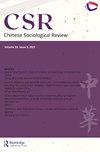The impact of parental migration on depression of children: new evidence from rural China
IF 1.4
2区 社会学
Q2 SOCIOLOGY
引用次数: 14
Abstract
Abstract Using data from a 2017 survey in western China, we examine whether remittances received from migrant family members and household work burden play moderating roles in children’s depression. We also explore the extent to which interpersonal factors (parent-child communication and parenting practices) and child’s intrapersonal personality trait (assessed by self-esteem) mediate the impact of parental migration on children’s depression. Results show that receipt of remittances significantly helps mitigate their depression. Regardless of children’s left-behind-status, household work burden significantly increases their levels of depression. Levels of depression among children left-behind by both parents are mediated by parent-child communication, parental responsiveness, and children’s self-esteem. Findings reveal significant social costs due to parental migration in terms of child development. The policy implications of our findings are discussed.父母迁移对儿童抑郁的影响:来自中国农村的新证据
摘要利用2017年中国西部地区的一项调查数据,我们研究了外来务工人员家庭成员的汇款和家庭劳动负担是否在儿童抑郁中起调节作用。我们还探讨了人际因素(亲子沟通和养育实践)和儿童的内在人格特质(以自尊评估)在父母迁移对儿童抑郁的影响中所起的中介作用。结果表明,收到汇款显著有助于减轻他们的抑郁。无论儿童是否留守,家务劳动负担都显著增加了他们的抑郁程度。父母双方留守儿童的抑郁水平受亲子沟通、父母反应和儿童自尊的调节。研究结果揭示了由于父母迁移在儿童发展方面造成的重大社会成本。本文还讨论了研究结果的政策含义。
本文章由计算机程序翻译,如有差异,请以英文原文为准。
求助全文
约1分钟内获得全文
求助全文

 求助内容:
求助内容: 应助结果提醒方式:
应助结果提醒方式:


